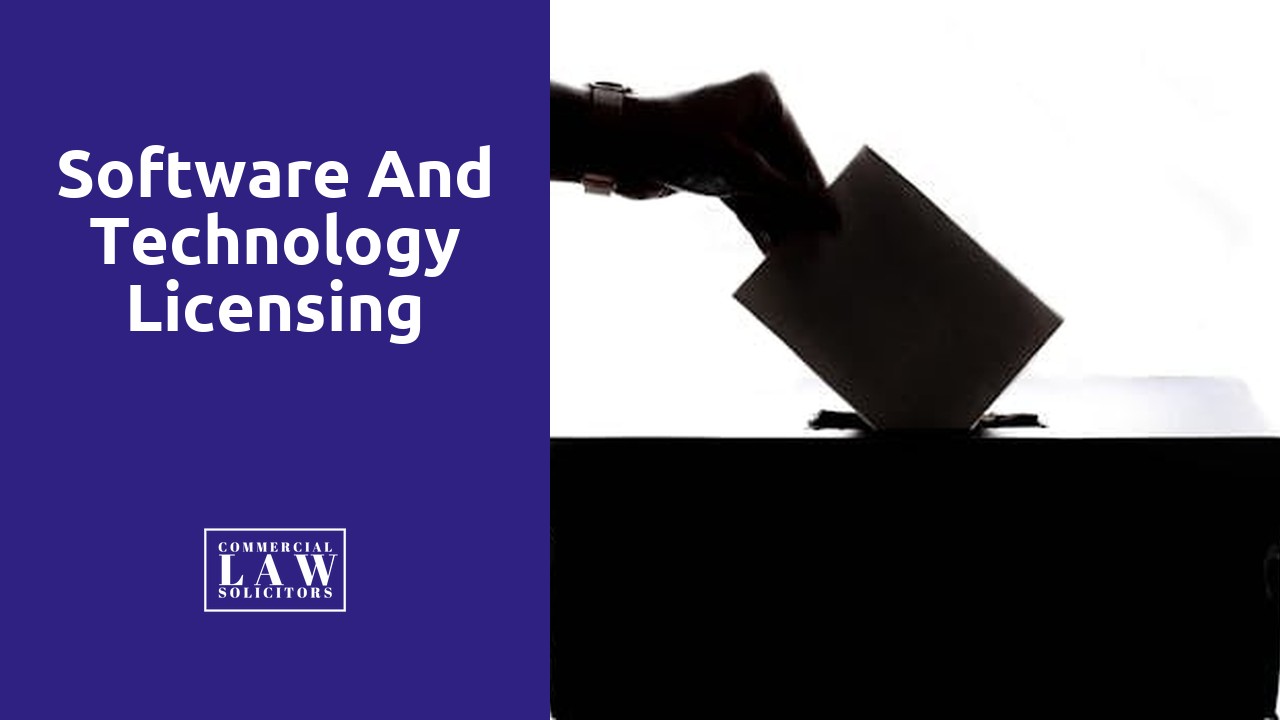Software and technology licensing

Understanding the Legal Framework for Digital Innovation
The legal framework surrounding digital innovation is a complex and ever-evolving landscape that requires a deep understanding to navigate successfully. From intellectual property rights to licensing agreements, businesses must have a solid grasp of the legal principles that govern their digital innovations. With the rapid advancements in technology, it is crucial for organizations to stay updated on the latest legal developments to protect their intellectual property and maximize their profitability.
One of the key considerations in understanding the legal framework for digital innovation is intellectual property rights. These rights serve as the foundation for protecting original ideas, inventions, and creative works. Patents, trademarks, and copyrights are common forms of intellectual property rights that provide legal protection against unauthorized use or infringement. By understanding the different types of intellectual property rights and the procedures for obtaining them, businesses can safeguard their innovations and prevent competitors from infringing upon their work. Additionally, understanding the limitations and exceptions to these rights is essential for navigating intellectual property issues within the digital landscape.
Navigating the World of Intellectual Property Rights
Intellectual property (IP) rights form the backbone of innovation and creativity in the digital world. Navigating the complexities of IP rights is crucial for individuals and businesses alike to protect their ideas, inventions, and designs. So, what exactly are intellectual property rights, and how can we effectively navigate this realm?
At its core, intellectual property encompasses intangible creations of human intellect, such as inventions, literary and artistic works, designs, symbols, names, and images used in commerce. These rights are legally granted to individuals and organizations, allowing them exclusive ownership and control over their creations. However, the world of intellectual property rights can be intricate and bewildering, with various legal frameworks and regulations to consider. It is essential to gain a firm understanding of these rights and how they apply to your work in order to safeguard your intellectual assets and maintain a competitive edge.
Unraveling the Complexities of Licensing Agreements
Licensing agreements play a significant role in the business world as companies seek to protect and monetize their intellectual property. However, navigating the complexities of these agreements can be a challenging endeavor. From understanding the legal jargon to negotiating favorable terms, it requires meticulous attention to detail and a thorough understanding of intellectual property rights.
One of the key complexities in licensing agreements lies in striking the right balance between granting enough rights to the licensee while safeguarding the interests of the licensor. This delicate balance requires careful consideration of various factors, such as the scope of the license, duration, territorial restrictions, and royalty fees. Additionally, experts suggest that it is crucial to include provisions for dispute resolution and termination in order to protect both parties involved. By unraveling these complexities and setting clear expectations, licensing agreements can serve as a valuable tool for companies to leverage their intellectual property and maximize their profitability.
Maximizing Profitability Through Strategic Licensing
In today's fast-paced digital landscape, companies are constantly seeking ways to maximize profitability and gain a competitive edge. One strategy that has proven to be highly effective is strategic licensing. By strategically licensing their intellectual property rights, companies can not only generate additional revenue streams but also tap into new markets and expand their customer base.
Strategic licensing enables companies to leverage their valuable intellectual property assets by granting others the rights to use, manufacture, or sell their products or technologies in exchange for licensing fees or royalties. This approach allows companies to monetize their IP while minimizing risks and costs associated with production, marketing, and distribution. Moreover, strategic licensing opens up opportunities for collaboration and innovation, as companies can partner with other industry players to jointly develop and commercialize new products or technologies. By adopting a proactive approach to licensing, companies can unlock the full potential of their intellectual property and maximize profitability in a rapidly evolving digital landscape.
The Role of Licensing in Driving Technological Advancements
The role of licensing in driving technological advancements cannot be overstated. Licensing agreements enable companies to leverage their intellectual property to fuel innovation and create new products and services. By granting licenses to other companies, the original IP holder can expand its reach and tap into new markets without bearing the full burden of research and development costs.
Licensing not only drives technological advancements but also fosters collaboration and knowledge sharing among industry players. When companies enter into licensing agreements, they gain access to a vast pool of intellectual capital that can accelerate the pace of innovation. This collaborative approach encourages the exchange of ideas, expertise, and resources, leading to breakthroughs that benefit the entire industry. By working together and leveraging each other's strengths, companies can drive technological advancements forward, pushing boundaries and revolutionizing various sectors.
Protecting Your Intellectual Property: A Guide to Licensing Best Practices
In today's digital age, protecting your intellectual property is more important than ever. With the rapid advancements in technology and the ease of sharing ideas, it is crucial for individuals and businesses to understand the best practices when it comes to licensing. By properly licensing your intellectual property, you can not only protect your ideas from being copied or stolen but also maximize your profitability.
One of the key aspects of licensing best practices is conducting thorough research on the potential licensees. Before entering into any licensing agreement, it is important to carefully evaluate the reputation and track record of the party you are considering. This includes reviewing their financial stability, their history of intellectual property compliance, and their overall business practices. By doing so, you can ensure that you are entering into a licensing agreement with a trustworthy and reliable partner.
Related Links
Intellectual property due diligence in mergers and acquisitionsIntellectual property licensing agreements
Brand protection and enforcement strategies
E-commerce and intellectual property rights
Dispute resolution in intellectual property cases